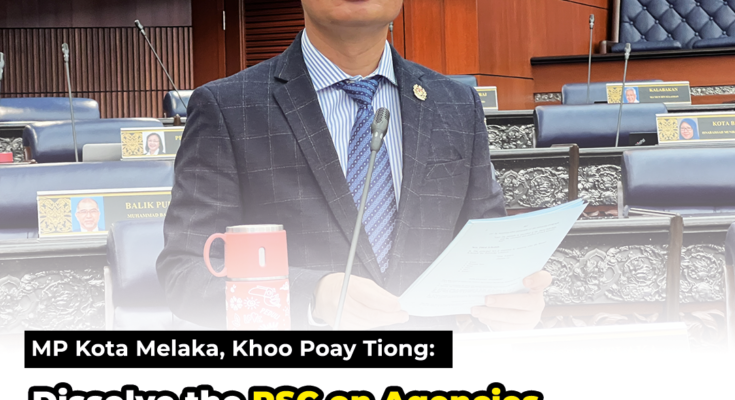The Parliamentary Select Committee (PSC) on Agencies under the Prime Minister’s Department should be dissolved upon its expiry on 10 November 2022 as the committee has failed in its role to scrutinise and hold the government accountable on key public interest issues.
As a member of the PSC, it has been a frustrating experience for me to be part of a PSC that lacks the political will and leadership to function effectively. Major public interest issues, such as the Azam Baki share ownership scandal, remain unresolved and beyond the reach of the PSC’s scrutiny.
It has been more than eight months since the PSC summoned Tan Sri Azam Baki to answer for his share ownership scandal. Yet, Azam Baki continues to hold parliament in contempt by refusing to appear before the committee.
The PSC has also faced numerous procedural roadblocks that made it toothless to scrutinise Azam Baki. Among others, the chairman of the committee unilaterally cancelled the meeting after Azam Baki wrote a letter explaining his refusal to attend the meeting.
The parliament’s legal advisor took more than six months to issue its legal opinion to the members of the PSC on this issue. Unsurprisingly, the parliament legal advisor sang the same song as Azam Baki, saying that it would be sub judice for the PSC to summon Azam Baki and discuss his share ownership issue. As of today, this is still left hanging without any solution.
Throughout 2022, the PSC on Agencies under the Prime Minister’s Department has only convened three times, despite my proposal that the committee should meet at least once a month. Most of the committee meetings have been filled with standard briefings and presentations by government agencies, while substantial issues such as the Azam Baki scandal are ignored.
Recently, I have also proposed to the chairman to summon the Malaysian Anti-Corruption Commission (MACC) to explain the Littoral Combat Ship (LCS) issue. The chairman, however, did not provide any response.
I write these reflections in hope that the Dewan Rakyat will critically review and strengthen the PSC system in the upcoming parliament session. It will be a waste of time and resources if PSCs are re-established without the proper authority and processes to carry out their role effectively.
Among others, my suggestions to reform and strengthen the PSCs are as follows:
(1) The scope of the existing PSCs should be reviewed and redefined. For example, the scope of the PSC on Agencies under the Prime Minister’s Department is too wide. It covers numerous agencies and issues. This hinders the PSC from functioning effectively as it has no clear focus.
(2) The role of the PSCs’ chairperson should be spelt out clearly. The chairperson must not be given the authority to act or make decisions unilaterally without the collective agreement of the PSC.
(3) The Dewan Rakyat should establish the ground rules for the basic functioning of the PSCs, for example on the frequency of meetings, attendance of its members, and reporting procedures.
(4) The Dewan Rakyat should make it clear that it is compulsory for agencies, groups, or individuals to appear before the PSCs if they are summoned. Non-attendance would be treated as contempt towards parliament.
(5) The PSCs should be empowered, via its terms of reference, to set their own agenda and issues to scrutinise as long as it is within the general scope approved by the Dewan Rakyat. For example, the Dewan Rakyat would empower the PSC on Education to scrutinise matters pertaining to the Ministry of Education. It would then be up to the committee to decide what specific issues to discuss and who it would like to summon.
(6) The proceedings of the PSCs’ meeting should be open for members of the public to attend, unless it involves sensitive information, such as those pertaining to national security. The proceedings should be broadcasted live on television and via the internet.
Khoo Poay Tiong
MP Kota Melaka




